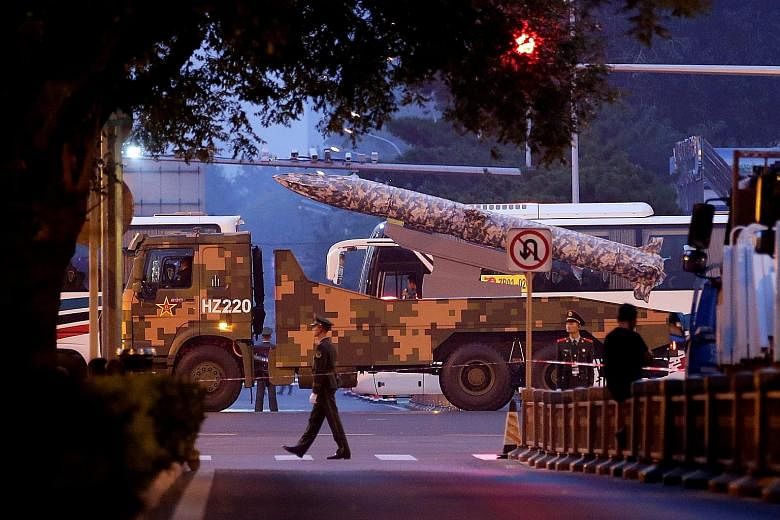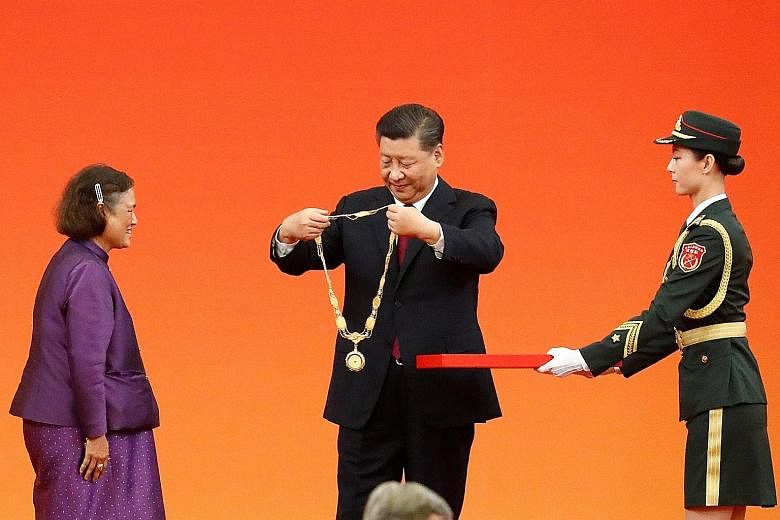BEIJING • China's tightly choreographed 70th birthday bash risks being upstaged by pro-democracy protests in Hong Kong, which could present a discordant picture just as the Chinese Communist Party is being feted in Beijing.
A military parade tomorrow, marking the ruling Communist Party's 70th anniversary in power, will offer a rare look at China's rapidly developing arsenal, including possibly a nuclear-armed missile that could reach the United States in 30 minutes, as Beijing gets closer to matching Washington and other powers in weapons technology.
The Dongfeng-41 is one of a series of new weapons the Chinese media says might be unveiled during the parade. Others include a supersonic drone and a robot submarine.
The parade will highlight Beijing's ambition to enforce claims to Taiwan, the South China Sea and other disputed territories - and to challenge Washington as the region's dominant force.
The People's Liberation Army (PLA), the world's biggest military, with two million men and women in uniform and the second-highest annual spending after the United States military, is also working on fighter planes, the first Chinese-built aircraft carrier and nuclear-powered submarines.
"There are quite a lot of observers, including the US military, who say, 'This is getting close to what we do', and they are starting to worry," said Mr Siemon Wezeman of the Stockholm International Peace Research Institute.
Tomorrow's parade will include 15,000 troops, over 160 aircraft and 580 pieces of military equipment, according to Ministry of Defence spokesman Major-General Cai Zhijun. Many new weapons "will be shown for the first time", he told reporters last week.
When asked whether that would include the Dongfeng-41, he said, "Please wait and see."
The ability to project power is increasingly urgent for Chinese leaders who want to control shipping lanes and waters also claimed by Japan, South Korea, Vietnam, the Philippines and other governments.
But as President Xi Jinping gets ready to preside over the parade and a gala event tomorrow, Hong Kong protest organisers have promised their own major rallies.
Hong Kong police in the past have denied permission to hold some protests, citing public safety concerns, and it is not clear whether organisers have the green light for events tomorrow.
By rallying on Oct 1, Hong Kong protesters will attempt to "underscore the difference between dictatorial China and free Hong Kong", said Dr Willy Lam, a professor at The Chinese University of Hong Kong.
The city government has cancelled the national day fireworks at Hong Kong's glittering waterfront near Victoria Harbour.
Mr Michael Chugani, a broadcaster and political commentator in Hong Kong, said: "It would embarrass Beijing even more if there is a repetition of what happened on July 1, when Hong Kong marked the 22nd anniversary of reunification."
In July, Hong Kong officials had to watch the flag-raising ceremony on large screens locked up inside a convention centre, while hundreds of thousands marched in the streets and a group of radical protesters stormed the city's Parliament.
The flag-raising ceremony tomorrow will also be held indoors.
Over the past 17 weeks, Hong Kong has witnessed the worst political unrest since its handover to China in 1997, with huge pro-democracy rallies as well as increasingly intense clashes between police and some violent protesters.
Leading up to the anniversary, Mr Xi yesterday awarded medals and honorary titles to an array of domestic and international "heroes", including a former French prime minister and a centenarian Canadian educator. "The heroes and role models are all devoted to the cause of the party and the people... and hold fast to working for the happiness of the Chinese people," said Mr Xi.
Ms Isabel Crook, a Canadian anthropologist and educator born in 1915, was the oldest awardee present and had lived in China since before the founding of the People's Republic in 1949, according to official news agency Xinhua. The centenarian made "outstanding contributions in the cause for China's education and friendly exchanges with foreign countries", Xinhua reported.
Former French prime minister Jean-Pierre Raffarin was recognised for his "long-term commitment to promoting China-France friendship", said Xinhua.
Ms Tu Youyou, the first Chinese citizen to receive the Nobel Peace Prize for helping create anti-malaria medicine, was among the list of Chinese awardees, as well as Mr Yu Min, a nuclear physicist widely regarded as the "father of China's hydrogen bomb".


